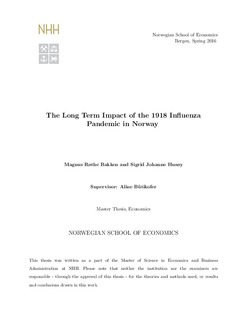The long term impact of the 1918 influenza pandemic in Norway
Master thesis
Permanent lenke
http://hdl.handle.net/11250/2403396Utgivelsesdato
2016Metadata
Vis full innførselSamlinger
- CELE - Master thesis [12]
Sammendrag
A growing literature show the negative effect of prenatal health shocks on childhood
and adult outcomes. Several studies exploit disease outbreaks to find causal effects
of in utero exposure on various outcomes. We build on the existing literature by
applying theories of in utero health effects to Norwegian data. This thesis uses the
1918 Spanish Influenza pandemic as a natural experiment to investigate the impact
of prenatal health shock on various long term outcomes in Norway. Influenza is
considered a negative shock to the intrauterine environment, and has been shown
to lower both cognitive and non-cognitive abilities. We use unique historical data
provided by Statistics Norway that contains information on the Influenza mortality
and morbidity rate, the number of still births and population estimates from 1912
to 1919. In addition, we have collected data from the Statistical Bulletin which
provides information on tax income in all municipalities. This data is matched to
the 1960 census, allowing us to estimate effects on year of education, marital status,
number of children and employment status. We find that exposure to prenatal
Influenza leads to a reduction in years of education for men. This effect is twice
as large for the poorest municipalities in Norway, indicating that negative shocks
are more severe for the lower socioeconomic groups. Since early intervention is far
more bene_cial for both social and economic outcomes, than interventions later in
life, measures to prevent these serious implications are relatively cheap and easily
attainable, and should be offered to all pregnant women.
Beskrivelse
Advisor: Aline Bütikofer
